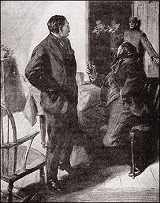McMurdo made a wry face. “Well, I’m not forgetting it,” he said; “but it’s worth it.”
“Yes, it’s worth it,” the other answered, “to those that are loyal and go through with it and are a help to the lodge. What were you speaking to Brother Morris about on Miller Hill this morning?”
The question came so suddenly that it was well that he had his answer prepared. He burst into a hearty laugh. “Morris didn’t know I could earn a living here at home. He shan’t know either; for he has got too much conscience for the likes of me. But he’s a good-hearted old chap. It was his idea that I was at a loose end, and that he would do me a good turn by offering me a clerkship in a drygoods store.”
“Oh, that was it?”
“Yes, that was it.”
“And you refused it?”
“Sure. Couldn’t I earn ten times as much in my own bedroom with four hours’ work?”
“That’s so. But I wouldn’t get about too much with Morris.”
“Why not?”
“Well, I guess because I tell you not. That’s enough for most folk in these parts.”
“It may be enough for most folk; but it ain’t enough for me, Councillor, ” said McMurdo boldly. “If you are a judge of men, you’ll know that.”
The swarthy giant glared at him, and his hairy paw closed for an instant round the glass as though he would hurl it at the head of his companion. Then he laughed in his loud, boisterous, insincere fashion.
“You’re a queer card, for sure,” said he. “Well, if you want reasons, I’ll give them. Did Morris say nothing to you against the lodge?”
“No.”
“Nor against me?”
“No.”
“Well, that’s because he daren’t trust you. But in his heart he is not a loyal brother. We know that well. So we watch him and we wait for the time to admonish him. I’m thinking that the time is drawing near. There’s no room for scabby sheep in our pen. But if you keep company with a disloyal man, we might think that you were disloyal, too. See?”
“There’s no chance of my keeping company with him; for I dislike the man,” McMurdo answered. “As to being disloyal, if it was any man but you he would not use the word to me twice.”
“Well, that’s enough,” said McGinty, draining off his glass. “I came down to give you a word in season, and you’ve had it.”
“I’d like to know,” said McMurdo, “how you ever came to learn that I had spoken with Morris at all?”
McGinty laughed. “It’s my business to know what goes on in this township,” said he. “I guess you’d best reckon on my hearing all that passes. Well, time’s up, and I’ll just say- -”

But his leavetaking was cut short in a very unexpected fashion. With a sudden crash the door flew open, and three frowning, intent faces glared in at them from under the peaks of police caps. McMurdo sprang to his feet and half drew his revolver; but his arm stopped midway as he became conscious that two Winchester rifles were levelled at his head. A man in uniform advanced into the room, a six-shooter in his hand. It was Captain Marvin, once of Chicago, and now of the Mine Constabulary. He shook his head with a half-smile at McMurdo.
“I thought you’d be getting into trouble, Mr. Crooked McMurdo of Chicago,” said he. “Can’t keep out of it, can you? Take your hat and come along with us.”
“I guess you’ll pay for this, Captain Marvin,” said McGinty. “Who are you, I’d like to know, to break into a house in this fashion and molest honest, law-abiding men?”
“You’re standing out in this deal, Councillor McGinty,” said the police captain. “We are not out after you, but after this man McMurdo. It is for you to help, not to hinder us in our duty.”